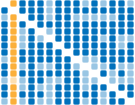The page of Rimbaud, Arthur, English biography
Biography
Jean Nicolas Arthur Rimbaud (October 20, 1854 – November 10, 1891) was a French poet, born in Charleville.Life and work
He was born into the rural middle class of Charleville (now part of Charleville-Mézières) in the Ardennes département in northeastern France. As a boy Rimbaud was a restless but brilliant student. By the age of fifteen, he had won many prizes and composed original verses and dialogues in Latin.
In 1870 his teacher Georges Izambard became Rimbaud's first literary mentor, and his original verses in French began to improve rapidly. He frequently ran away from home and may have briefly joined the Paris Commune of 1871, which he portrayed in his poem "L'Orgie parisienne ou Paris se repeuple" (the Parisian orgy or Paris repopulates). He may have been a victim of sexual assault by drunken Communard soldiers (his poem "Le Cœur supplicié" - "The Tortured Heart" - suggests so). By then he had become an anarchist, started drinking and amused himself by shocking the local bourgeois with his shabby dressing and long hair. At the same time he wrote to Izambard and Paul Démeny about his method for attaining poetical transcendence or visionary power through a "long, immense and rational derangement of all the senses" ("Les lettres du Voyant" - "The Letters of the Seer"). He returned to Paris in late September 1871 at the invitation of the eminent Parnassian poet Paul Verlaine (profoundly impressed by the reading of Rimbaud's masterwork "Le bateau ivre", "The Drunken Boat"), moving briefly into Verlaine's home. Verlaine (who was bisexual), promptly fell in love with the sullen blue-eyed overgrown (5 ft 10 in) light-brown haired adolescent, and shortly after they became lovers, leading a dissolute vagabond-like life, rocked by absinthe and hashish taking. They scandalized the Parisian literary elite, particularly on account of the outrageous behaviour of Rimbaud, the archetypical enfant terrible. Throughout this period he continued to write strikingly visionary, modern verses, topping his master Charles Baudelaire.
Rimbaud's and Verlaine's stormy homosexual relationship took them to London in 1872, when Verlaine left his wife and infant son (whom he used to mistreat badly during his alcoholic rages). In July 1873, after a particularly violent quarrel in Brussels train station, Verlaine shot Rimbaud in the wrist. Fearing for his life, Rimbaud called for the police. Verlaine was arrested and subjected to a humiliating medico-legal examination, following the perusal of their compromising correspondance and the accusations of Verlaine's wife about the "nature" of their friendship. The judge was merciless and, in spite of Rimbaud having withdrawn the complaint, he sentenced Verlaine to two years in prison. Rimbaud returned home to Charleville and completed his Une Saison en Enfer (A Season in Hell) in prose, widely regarded as one of the pioneering instances of modern Symbolist writing and a description of that "drôle de ménage" (hell of a couple) life with Verlaine, his "pitoyable frère" ("sorrowful brother"), the "vierge folle" ("mad virgin") of whom he was "l'époux infernal" ("the hellish husband"). In 1874 he returned to London with the poet Germain Nouveau and assembled his controversial Illuminations, which includes the first two French poems in free verse.
Later life (1875-1891)
Rimbaud and Verlaine met for the last time in 1875 in Germany, after Verlaine's release from prison and his conversion to Catholicism. By then Rimbaud had given up writing and decided on a steady, working life, fed up with his former wild living (some say), or having decided to become rich and independent to afford living one day as a carefree poet and man of letters (some speculate). He continued to travel extensively in Europe mostly on foot. In the summer of 1876 he enlisted as a soldier in the Dutch Army to travel free of charge to Java (Indonesia) where he promptly deserted, returning to France by ship. He traveled to Cyprus and in 1880 finally settled in Aden as a main employee in the Bardey agency. He had several native women as lovers and for a while he lived with an Abyssinian mistress. In 1884 he quit the job at Bardey's and became a merchant on his own in Harar, Abyssinia (modern Ethiopia). He made a small fortune as a gun-runner. Rimbaud developed right knee synovitis which degenerated into a carcinoma, and his state forced him to return to France on May 9, 1891, where his leg was amputated on May 27. Rimbaud died in Marseille on November 10, 1891, aged 37.
http://en.wikipedia.org




